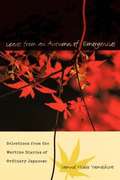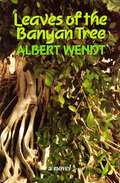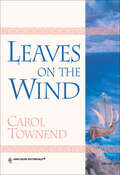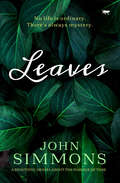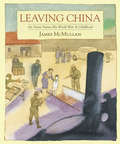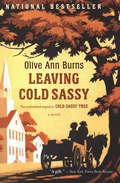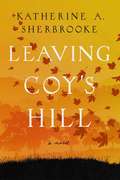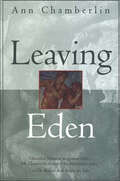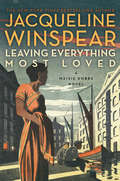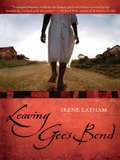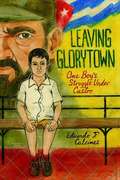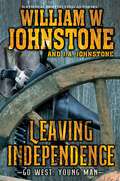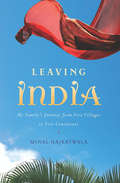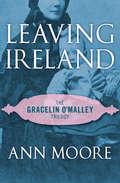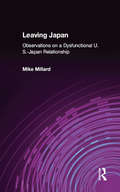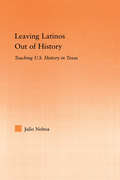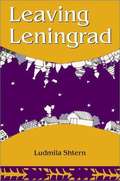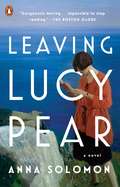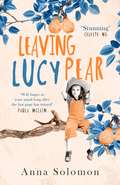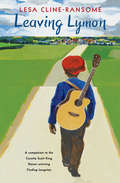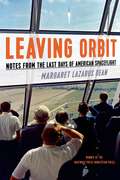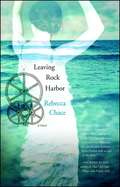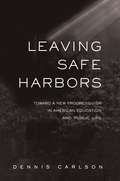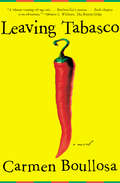- Table View
- List View
Leaves from an Autumn of Emergencies: Selections from the Wartime Diaries of Ordinary Japanese
by Samuel YamashitaThis collection of diaries gives readers a powerful, firsthand look at the effects of the Pacific War on eight ordinary Japanese. Immediate, vivid, and at times surprisingly frank, the diaries chronicle the last years of the war and its aftermath as experienced by a navy kamikaze pilot.
Leaves of the Banyan Tree
by Albert WendtSpanning three generations, this epic novel tells the story of a family and community in Western Samoa, exploring themes such as greed, corruption, colonialism, exploitation and revenge. A classic work of Pacific literature. Written by a British author, this novel utilizes British spellings and punctuation styles. A single quotation mark is used for opening and closing dialogue, while the double quotation mark is used for interior quotes. There are no periods after titles such as Dr, Mr, or Mrs. There is a glossary at the end of the book that is very helpful to read first, then refer to throughout reading.
Leaves on the Wind
by Carol TownendLoving the EnemyAfter Judith Coverdale saw her family's estate razed to the ground by Normans, she vowed to avenge her family's honor. She donned a boy's disguise and joined a band of outlaws, led by her brother, to terrorize the invaders. When disaster struck, Judith found herself in the strong arms of the great warrior Rannulf de Mandeville. What she soon realized was that Rannulf was the brother of the murdering Norman who'd stolen her lands. Time and time again, Rannulf proved his devotion to her and taught her lessons in survival, but would she ever accept his love?
Leaves: A Beautiful Drama about the Passage of Time
by John SimmonsExperience London in 1970 as a journalist captures a community’s ups and downs over the course of a year in this slice-of-life saga.Ophelia Street, 1970. A street like any other, a community that lives and breathes together as people struggle with their commitments and pursue their dreams. It is a world we recognise, a world where class and gender divide, where set roles are acknowledged. But what happens when individuals step outside those roles?An observer amid Ophelia Street watches, writes, imagines, remembers, charting the lives and loves of his neighbours over the course of four seasons, revealing the flimsily disguised underbelly of urban life in all its challenging glory. As the leaves turn from vibrant green to vivid gold, so lives turn and change too, laying bare the truth of the community. Perhaps, ultimately, we all exist on Ophelia Street.
Leaving China: An Artist Paints His World War II Childhood
by James McMullanA memoir in paintings and words by internationally acclaimed illustrator, author, and teacher James McMullan. A Booklist Top 10 Biography for Youth“It is this dreamlike quality of my memories that I wanted to capture in some way in the paintings that accompany the text--to suggest in the images that the events occurred a long time ago in a simpler yet more exotic world, and that the players in that world, including me, are at a distance.” Artist James McMullan’s work has appeared in the pages of virtually every American magazine, on the posters for more than seventy Lincoln Center theater productions, and in bestselling picture books. Now, in a unique memoir comprising more than fifty short essays and illustrations, the artist explores how his early childhood in China and wartime journeys with his mother influenced his whole life, especially his painting and illustration. James McMullan was born in Tsingtao, North China, in 1934, the grandson of missionaries who settled there. As a little boy, Jim took for granted a privileged life of household servants, rickshaw rides, and picnics on the shore—until World War II erupted and life changed drastically. Jim’s father, a British citizen fluent in several Chinese dialects, joined the Allied forces. For the next several years, Jim and his mother moved from one place to another—Shanghai, San Francisco, Vancouver, Darjeeling—first escaping Japanese occupation then trying to find security, with no clear destination except the unpredictable end of the war. For Jim, those ever-changing years took on the quality of a dream, sometimes a nightmare, a feeling that persists in the stunning full-page, full-color paintings that along with their accompanying text tell the story of Leaving China.
Leaving Cold Sassy: A Novel (Cold Sassy)
by Olive Ann Burns&“A gift&” for those who loved the heartwarming million-copy bestseller Cold Sassy Tree (The New York Times). Anyone who came under the spell of Olive Ann Burns&’s classic novel Cold Sassy Tree will delight in Leaving Cold Sassy, which returns to the story of the unforgettable Will Tweedy. In 1917, twenty-five-year-old Will now faces the complexities of adult life. He grapples with the influences of the modern world on his cherished Georgia hometown, which has recently been renamed Progressive City, and he finds his wife-to-be in a feisty young schoolteacher named Sanna Klein. Burns had completed fifteen chapters of this novel by the time of her death in 1990, and she expressed her wish for them to be published, as they are here, with her notes for future scenes. In addition, Burns&’s longtime editor and friend, Katrina Kenison, leaves us with an appreciative reminiscence of the beloved author and the legacy she left behind. &“This is all the news from Cold Sassy we will ever have and its scarcity makes it more precious.&” —The Atlanta Journal-Constitution
Leaving Cold Sassy: The Unfinished Sequel to Cold Sassy Tree
by Olive Ann BurnsThe book includes the letter dictated by the author in her final days as she realized she wouldn't be able to finish her book.
Leaving Coy's Hill: A Novel
by Katherine A. SherbrookeAn unforgettable story about the triumphs and travails of a woman unwilling to play by the rules, based on the the remarkable life of pioneering feminist and abolitionist Lucy Stone.Born on a farm in 1818, Lucy Stone dreamt of extraordinary things for a girl of her time, like continuing her education beyond the eighth grade and working for the abolitionist cause, and of ordinary things, such as raising a family of her own. But when she learns that the Constitution affords no rights to married women, she declares that she will never marry and dedicates her life to fighting for change. At a time when it is considered promiscuous for women to speak in public, Lucy risks everything for the anti-slavery movement, her powerful oratory mesmerizing even her most ardent detractors as she rapidly becomes a household name. And when she begins to lecture on the &“woman question,&” she inspires a young Susan B. Anthony to join the movement. But life as a crusader is a lonely one. When Henry Blackwell, a dashing and forward-thinking man, proposes a marriage of equals, Lucy must reconcile her desire for love and children with her public persona and the legal perils of marriage she has long railed against. And when a wrenching controversy pits Stone and Anthony against each other, Lucy makes a decision that will impact her legacy forever. Based on true events, Leaving Coy&’s Hill is a timeless story of women&’s quest for personal and professional fulfillment within society&’s stubborn constraints. And as an abolitionist and women&’s rights activist fighting for the future of a deeply divided country, Lucy Stone&’s quest to live a life on her own terms is as relevant as ever. In this &“propulsive,&” &“astonishing,&” and &“powerful&” story, Katherine Sherbrooke brings to life a true American heroine for a new generation.
Leaving Eden
by Ann ChamberlinLeaving Eden brilliantly brings to life that watershed moment in our history when man -- and woman -- turned their backs on the most ancient of laws in order to strike out in independence. Told from the point of view young Na'amah, Adam's daughter by his first wife, Lilith, it tells of the passing of the ancient Goddess and the birth of the new God.At the Publisher's request, this title is being sold without Digital Rights Management Software (DRM) applied.
Leaving Everything Most Loved: A Maisie Dobbs Novel (Maisie Dobbs #10)
by Jacqueline WinspearThe death of an Indian immigrant leads Maisie Dobbs into a dangerous yet fascinating world and takes her in an unexpected direction in this latest chapter of the New York Times bestselling series "that seems to get better with each entry" (Wall Street Journal).London, 1933. Two months after the body of an Indian woman named Usha Pramal is found in the brackish water of a South London canal, her brother, newly arrived in England, turns to Maisie Dobbs to find out the truth about her death. Not only has Scotland Yard made no arrests, evidence indicates that they failed to conduct a full and thorough investigation.Before her death, Usha was staying at an ayah's hostel alongside Indian women whose British employers turned them out into the street--penniless and far from their homeland--when their services were no longer needed. As Maisie soon learns, Usha was different from the hostel's other lodgers. But with this discovery comes new danger: another Indian woman who had information about Usha is found murdered before she can talk to Maisie.As Maisie is pulled deeper into an unfamiliar yet captivating subculture, her investigation becomes clouded by the unfinished business of a previous case as well as a growing desire to see more of the world, following in the footsteps of her former mentor, Maurice Blanche. And there is her lover, James Compton, who gives her an ultimatum she cannot ignore.Bringing a crucial chapter in the life and times of Maisie Dobbs to a close, Leaving Everything Most Loved marks a pivotal moment in this remarkable series.
Leaving Gee's Bend
by Irene LathamLudelphia Bennett may be blind in one eye, but she can still put in a good stitch. Ludelphia sews all the time, especially when things go wrong. But when Mama goes into labor early and gets deathly ill, it seems like even quilting won?t help. That?s when Ludelphia decides to do something drastic?leave Gee?s Bend for the very first time. Mama needs medicine that can only be found miles away in Camden. But that doesn?t stop Ludelphia. She just puts one foot in front of the other. What ensues is a wonderful, riveting and sometimes dangerous adventure. Ludelphia weathers each challenge in a way that would make her mother proud, and ends up saving the day for her entire town. Set in 1932 and inspired by the rich quilting history of Gee?s Bend, Alabama, Leaving Gee?s Bend is a delightful, satisfying story of a young girl facing a brave new world. .
Leaving Glorytown: One Boy's Struggle under Castro
by Eduardo F. CalcinesIn this absorbing memoir, by turns humorous and heartbreaking, Eduardo Calcines recounts his boyhood and chronicles the conditions that led him to wish above all else to leave behind his beloved extended family and his home for a chance at a better future.
Leaving Independence (Go West, Young Man)
by William W. Johnstone J.A. JohnstoneLegendary national bestselling Western authors William W. Johnstone and J.A. Johnstone return with their latest installment in the long-running First Mountain Man series. Independence, Missouri, 1865. Seasoned wagon master Virgil Grissom prepares to lead a new group of families westward across the Oregon Trail. Among them are struggling farmer Matt Moran, his wife Katie, and their three small children. In spite of the long, treacherous journey ahead, Grissom is confident that this solid, hard-working farmer and his family are tough enough to endure the harsh elements, the rugged terrain, and the occasional run-in with hostile tribes. But he&’s not so sure about the farmer&’s younger brother, Clay, who plans to catch up with them along the trail. Alone. Which has Grissom worried . . . On the Oregon Trail, a lone man is dead man. Clay Moran fought hard in the Civil War, serving as lieutenant in the US Calvary. Now that Robert E. Lee has surrendered, Clay is free to head west with his brother&’s family. Problem is, the wagon train has left Independence already—and Clay has to go it alone. Luckily, the army let him keep his horse. But when a couple of bushwhackers steal that horse and all his money, he&’s left high and dry. If Clay hopes to catch up with the wagon train, he&’ll have to rely on his wits. His guts. And every skill he learned in the war. Along the way, he&’ll have to do things a man should never have to do—just to survive . . . JOHNSTONE COUNTRY. GO WEST, LIVE FREE, OR DIE TRYING.
Leaving India: My Family's Journey from Five Villages to Five Continents
by Minal HajratwalaThe PEN Award–winning chronicle of the Indian diaspora told through the stories of the author&’s own family. In this &“rich, entertaining and illuminating story,&” Minal Hajratwala mixes history, memoir, and reportage to explore the collisions of choice and history that led her family to emigrate from India (San Francisco Chronicle). &“Meticulously researched and evocatively written&” (The Washington Post), Leaving India looks for answers to the eternal questions that faced not only Hajratwala&’s own Indian family but all immigrants, everywhere: Where did we come from? Why did we leave? What did we give up and gain in the process? Beginning with her great-grandfather Motiram&’s original flight from British-occupied India to Fiji, where he rose from tailor to department store mogul, Hajratwala follows her ancestors across the twentieth-century to explain how they came to be spread across five continents and nine countries. As she delves into the relationship between personal choice and the great historical forces—British colonialism, apartheid, Gandhi&’s salt march, and American immigration policy—that helped shape her family&’s experiences, Hajratwala brings to light for the very first time the story of the Indian diaspora. A luminous narrative from &“a fine daughter of the continent, bringing insight, intelligence and compassion to the lives and sojourns of her far-flung kin,&” Leaving India offers a deeply intimate look at what it means to call more than one part of the world home (Alice Walker).
Leaving Ireland: Gracelin O'malley, Leaving Ireland, And 'til Morning Light (The Gracelin O'Malley Trilogy #2)
by Ann MooreAn Irish mother must flee her beloved homeland for a new life in America, in the &“gripping&” second novel of the acclaimed historical trilogy (Publishers Weekly). Forced to flee Ireland, Gracelin O&’Malley boards a coffin ship bound for America, taking her young daughter with her on the arduous transatlantic voyage. In New York, Gracelin struggles to adapt to a strange new world and to the harsh realities of immigrant life in a city teeming with crime, corruption, and anti-Irish prejudice. As she tries to make a life for herself and her daughter, she reunites with her brother, Sean . . . and a man she thought she&’d never see again. When her friendship with a runaway slave sweeps her into the volatile abolitionist movement, Gracelin gains entrée to the drawing rooms of the wealthy and powerful. Still, the injustice all around her threatens the future of those she loves, and once again, she must do the unthinkable. This sweeping novel of the Irish immigrant experience in 1840s America brings a long-ago world to vibrant life and continues a remarkable heroine&’s bold, dramatic journey through extraordinary times.
Leaving Japan: Observations on a Dysfunctional U.S.-Japan Relationship
by Mike MillardA critique of America's flawed Asia policy that centres on US-Japan relations but harkens back to the same disastrous views that drew America into Vietnam. The technique is a narrative flow of short vignettes woven into longer chapters; the main strands are personal reflections and interviews.
Leaving Latinos Out of History: Teaching US History in Texas
by Julio NoboaDespite being the state with perhaps the longest history of Latino presence, power and influence, Texas has very much under-represented Latinos in its schools history curriculum. Through an analysis of teaching materials and curriculum goals, Noboa investigates the extent to which this significant minority is effectively excluded from American historical narrative.
Leaving Leningrad
by Ludmila ShternAlthough women writers have held a conspicuous place in the history of modern Russian literature, they have been slow to find their true voices in exile. Ludmila Shtern, a geologist/writer who emigrated to the US from the Soviet Union in 1975, offers a completely fresh, unsentimental look at daily life in the former Soviet Union and the US in the second half of the 20th century. Her memoir, part comic bildungsroman, part picaresque adventure, shows its heroine, Tatyana Dargis, growing up in the USSR, falling in love, falling afoul of the KGB, and finally emigrating to the US where new absurdities (capitalist rather than communist in nature) prevail. An amalgam of bittersweet understatement and mordant wit, Shtern's prose is shaped by her ear for a wide range of human voices and the stories they tell, and by her eye for the grotesqueries and savagely funny pain of modern life.
Leaving Lucy Pear
by Anna Solomon"Anna Solomon writes with a poet's reverence for language and a novelist's ability to keep us turning the page. A gorgeous and engrossing meditation on motherhood, womanhood, and the sacrifices we make for love."--J. Courtney Sullivan, author of Maine and The EngagementsChosen as a must-read book for summer 2016 by TIME Magazine, InStyle, Us Weekly, Good Housekeeping, and The MillionsSet in 1920s New England, the story of two women who are both mothers to the same unforgettable girl--a big, heartrending novel from award-winning writer Anna SolomonOne night in 1917 Beatrice Haven sneaks out of her uncle's house on Cape Ann, Massachusetts, leaves her newborn baby at the foot of a pear tree, and watches as another woman claims the infant as her own. The unwed daughter of wealthy Jewish industrialists and a gifted pianist bound for Radcliffe, Bea plans to leave her shameful secret behind and make a fresh start. Ten years later, Prohibition is in full swing, post-WWI America is in the grips of rampant xenophobia, and Bea's hopes for her future remain unfulfilled. She returns to her uncle's house, seeking a refuge from her unhappiness. But she discovers far more when the rum-running manager of the local quarry inadvertently reunites her with Emma Murphy, the headstrong Irish Catholic woman who has been raising Bea's abandoned child--now a bright, bold, cross-dressing girl named Lucy Pear, with secrets of her own.In mesmerizing prose, award-winning author Anna Solomon weaves together an unforgettable group of characters as their lives collide on the New England coast. Set against one of America's most turbulent decades, Leaving Lucy Pear delves into questions of class, freedom, and the meaning of family, establishing Anna Solomon as one of our most captivating storytellers.From the Hardcover edition.
Leaving Lucy Pear
by Anna Solomon'Stunning language, raw emotion and profound wisdom' Celeste Ng, author of Everything I Never Told You'Solomon's strong prose and fleet pacing consistently provide the essential pleasures of a good story well told' Maggie Shipstead, The New York Times Book ReviewOne night in 1917 Beatrice Haven creeps out of her uncle's house on Cape Ann, Massachusetts, leaves her newborn baby at the foot of a pear tree, and watches as another woman claims the child as her own. A gifted pianist bound for Radcliffe, Bea plans to leave her shameful secret behind and make a fresh start. Ten years later, Prohibition is in full swing, post-WWI America is in the grips of rampant xenophobia, and Bea has returned to her uncle's house, seeking a refuge from her unhappiness. But the rum-running manager of the local quarry inadvertently reunites her with Emma Murphy, the headstrong Irish Catholic woman who has been raising her abandoned child - now a bright, bold, cross-dressing girl named Lucy Pear, with secrets of her own...
Leaving Lymon
by Lesa Cline-RansomeBehind every bad boy is a story worth hearing and at least one chance for redemption. It's 1946 and Lymon, uprooted from his life in the Deep South and moved up North, needs that chance. <P><P>Lymon's father is, for the time being, at Parchman Farm--the Mississippi State Penitentiary--and his mother, whom he doesn't remember all that much, has moved North. Fortunately, Lymon is being raised by his loving grandparents. Together, Lymon and his grandpops share a love of music, spending late summer nights playing the guitar. But Lymon's world as he knows it is about to dissolve. He will be sent on a journey to two Northern cities far from the country life he loves--and the version of himself he knows. In this companion novel to the Coretta Scott King Honor wining Finding Langston, readers will see a new side of the bully Lymon in this story of an angry boy whose raw talent, resilience, and devotion to music help point him in a new direction. <P><P>A Junior Library Guild Selection!
Leaving Orbit: Notes from the Last Days of American Spaceflight
by Margaret Lazarus DeanWinner of the Graywolf Press Nonfiction Prize, a breathtaking elegy to the waning days of human spaceflight as we have known itIn the 1960s, humans took their first steps away from Earth, and for a time our possibilities in space seemed endless. But in a time of austerity and in the wake of high-profile disasters like Challenger, that dream has ended. In early 2011, Margaret Lazarus Dean traveled to Cape Canaveral for NASA's last three space shuttle launches in order to bear witness to the end of an era. With Dean as our guide to Florida's Space Coast and to the history of NASA, Leaving Orbit takes the measure of what American spaceflight has achieved while reckoning with its earlier witnesses, such as Norman Mailer, Tom Wolfe, and Oriana Fallaci. Along the way, Dean meets NASA workers, astronauts, and space fans, gathering possible answers to the question: What does it mean that a spacefaring nation won't be going to space anymore?
Leaving Rock Harbor
by Rebecca ChaceAn unforgettable coming-of-age story and a luminous portrayal of a dramatic era of American history, Rebecca Chace’sLeaving Rock Harbortakes readers into the heart of a New England mill town in the early twentieth century. On the eve of World War I, fourteen-year-old Frankie Ross and her parents leave their simple life in Poughkeepsie to seek a new beginning in the booming city of Rock Harbor, Massachusetts. Frankie’s father finds work in a bustling cotton mill, but erupting labor strikes threaten to dismantle the town’s socioeconomic structure. Frankie soon befriends two charismatic young men—Winslow Curtis, privileged son of the town’s most powerful politician, and Joe Barros, a Portuguese mill worker who becomes a union organizer—forming a tender yet bittersweet love triangle that will have an impact on all three throughout their lives. Inspired in part by Chace’s family history, Frankie’s journey to adulthood takes us through the First World War and into the Jazz Age, followed by the Great Depression—from rags to riches and back again. Her life parallels the evolution of the mill town itself, and the lost promise of a boomtown that everyone thought would last forever. Of her acclaimed novelCapture the Flag, theLos Angeles Timessaid, "Chace’s writing resembles a generation of New York writers heavily influenced by John Updike: Rick Moody, A. M. Homes, Susan Minot, and, more recently, Melissa Bank. " With its lyrical prose and compelling style,Leaving Rock Harborfurther establishes Chace’s position in that literary tradition.
Leaving Safe Harbors: Toward a New Progressivism in American Education and Public Life
by Dennis CarlsonTo rise to the challenges of postmodern culture, Carlson argues, progressives will need to leave the safe harbors of what is familiar and comfortable. A new progressivism can only be forged of a fundamental re-thinking and re-mythologizing of democratic education. Drawing upon cultural studies perspectives, Carlson interrogates philosophy through p
Leaving Tabasco: A Novel (Books That Changed the World)
by Carmen BoullosaA young woman encounters strange events in her Mexican hometown in this novel by an author who “immerses us…in her wickedly funny and imaginative world” (Latina).Leaving Tabasco tells of the coming of age of Delmira Ulloa, raised in an all-female home in Agustini, in the Mexican province of Tabasco. In Agustini it is not unusual to see your grandmother float above the bed when she sleeps, or to purchase torrential rains at a traveling fair, or to watch your family’s elderly serving woman develop stigmata, then disappear completely, to be canonized as a local saint. But as Delmira becomes a woman, she will set out on a search for her missing father, and must make a choice that could mean leaving her home forever, in a tale filled with both depth and delightful mystery that poses questions about just how real the real world is. “To flee Agustini is to leave not just a town but the viscerally primal dreamscape it represents.”— The New York Times Book Review“Vibrant…Each chapter is an adventure.”—The Boston Globe“We happily share with [Delmira] her life, including the infinitely charming town she inhabits [and] her grandmother’s fantastic imagination.”—The Washington Post Book World
